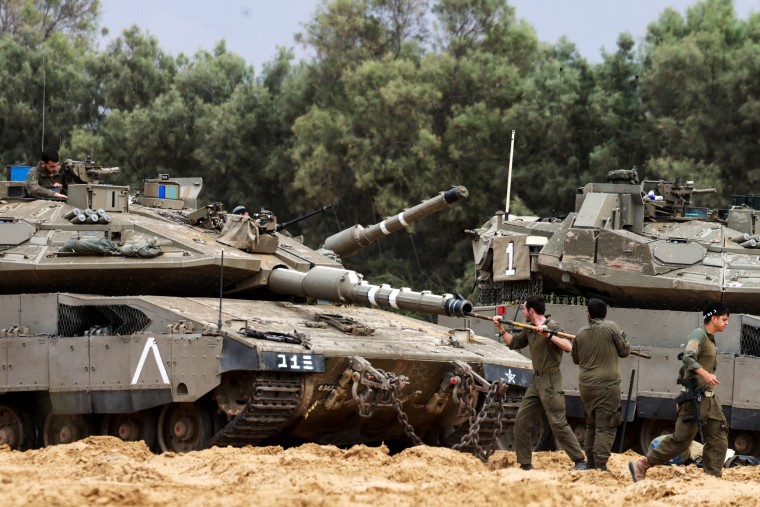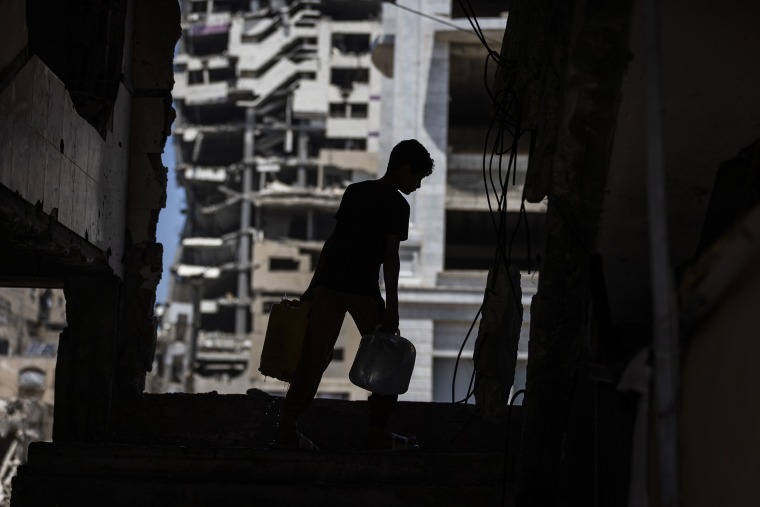Israel's security Cabinet has unanimously approved a plan to seize all of the Gaza Strip in what Prime Minister Benjamin Netanyahu said would be an intensive military operation aimed at defeating Hamas.
Palestinian civilians will be moved during the “powerful” new operation in Gaza, Netanyahu said in a video posted on social media, adding that his forces would not launch raids inside the enclave and then retreat.
The security Cabinet took the decision on the recommendation of Zamir, the military chief, Netanayhu said.
Israel, before the last ceasefire went into effect, had already taken full control of a third of Gaza.
The besieged enclave has been under the longest blockade of humanitarian aid since the war began in October 2023, as Israel’s total ban on the entry of all goods, including food, fuel and medical supplies, enters its third month. As a result, the risk of famine hangs over Gaza’s population, prompting alarm even among some of Israel’s closest allies.
The United Nations on Sunday rejected an Israeli proposal for aid distribution, describing it as “Israeli hubs under conditions set by the Israeli military.” It added that the plan was “dangerous” and appeared to “reinforce control over life-sustaining items as a pressure tactic,” and would mean that large parts of Gaza, including the less mobile and most vulnerable people, would continue to go without supplies.

But a senior Israeli security official said in a statement Monday that the “humanitarian blockade will continue, and only later — after the operational phase begins and a large-scale civilian evacuation to the south is completed — will a humanitarian plan be implemented.” They added that unlike in the past the military “will remain in every area it secures to prevent the return of terror.”
The Israeli army has begun calling up tens of thousands of reserve soldiers to “intensify and expand” its fight against Hamas in an attempt to get the militant group to return hostages still being held since the Oct. 7, 2023, terrorist attack.
“We are increasing the pressure with the aim of returning our men and defeating Hamas,” Israeli military chief Eyal Zamir said in a statement, adding that the troops would “operate in additional areas and destroy all infrastructure above and below the ground.”
However, some reservists have indicated they will refuse to serve in a war they increasingly view as politically motivated, and at a Knesset committee meeting Monday, Einav Zangauker, whose son Matan is being held hostage, called on soldiers “not to report for reserve duty for moral and ethical reasons.”
More than 51,000 people have been killed in Gaza since Israel launched its offensive, including thousands of women and children, according to the Palestinian Health Ministry.
The war has also decimated Gaza’s medical facilities and infrastructure and driven most of its population from their homes — often several times. The United Nations agency for Palestinian refugees, UNRWA, recently warned that nearly a half-million Palestinians in Gaza have been newly displaced.
Meanwhile, the families of the 59 remaining hostages under Hamas' captivity issued a "red alert" Monday over the impending expansion in Gaza.
“The expansion of military operations puts every hostage at grave risk,” the Hostages Families Forum Headquarters, said in a statement, adding, “It also threatens the lives of our soldiers and deepens the toll on countless Israeli families already carrying the burden of this war.”

Some 1,200 people were killed during Hamas' terrorist attacks in southern Israel, with around 250 taken hostage, according to Israeli counts, marking a major escalation in a decadeslong conflict.
Israel resumed launching airstrikes in Gaza after a fragile eight-week truce between Israel and Hamas collapsed March 18, just more than two weeks after the first phase of the three-part ceasefire deal came to an end. Negotiations on the second phase of the deal, meant to establish a permanent end to the fighting, have since stalled.
The ceasefire and hostage release talks could resume before a planned visit by President Donald Trump to the region next week, Israeli Minister Ze'ev Elkin told the public broadcaster Kan on Monday.
“There is still a window of opportunity until President Trump concludes his visit to the Middle East, if Hamas understands we are serious,” Elkin said.
Trump said last month that he and Netanyahu were “on the same side of every issue” in a post on Truth Social, shortly after the two leaders spoke over the phone.
In February, Trump announced that the U.S. would seek ownership of the Gaza Strip to develop it into the “Riviera of the Middle East,” after saying Palestinians have no choice but to leave their homes there.
He reiterated those plans after a meeting with Netanyahu at the White House in April, saying that the Gaza Strip was “an incredible piece of important real estate” and that U.S. control and ownership of the territory would “be a good thing.”
